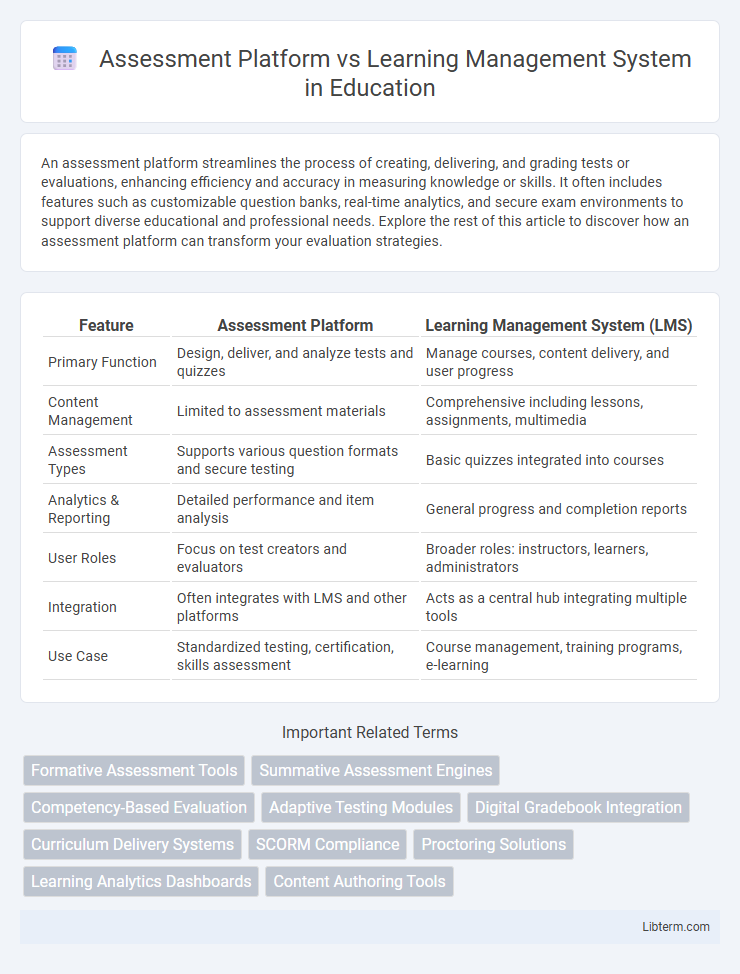An assessment platform streamlines the process of creating, delivering, and grading tests or evaluations, enhancing efficiency and accuracy in measuring knowledge or skills. It often includes features such as customizable question banks, real-time analytics, and secure exam environments to support diverse educational and professional needs. Explore the rest of this article to discover how an assessment platform can transform your evaluation strategies.
Table of Comparison
| Feature | Assessment Platform | Learning Management System (LMS) |
|---|---|---|
| Primary Function | Design, deliver, and analyze tests and quizzes | Manage courses, content delivery, and user progress |
| Content Management | Limited to assessment materials | Comprehensive including lessons, assignments, multimedia |
| Assessment Types | Supports various question formats and secure testing | Basic quizzes integrated into courses |
| Analytics & Reporting | Detailed performance and item analysis | General progress and completion reports |
| User Roles | Focus on test creators and evaluators | Broader roles: instructors, learners, administrators |
| Integration | Often integrates with LMS and other platforms | Acts as a central hub integrating multiple tools |
| Use Case | Standardized testing, certification, skills assessment | Course management, training programs, e-learning |
Understanding Assessment Platforms: Key Features
Assessment platforms offer specialized tools designed for creating, delivering, and analyzing assessments with features such as customizable question types, real-time analytics, and automated grading. These platforms support secure test environments through proctoring capabilities and provide detailed performance reports to inform instructional decisions. Integration with various learning management systems enhances data synchronization and streamlines user experience across educational technologies.
What Is a Learning Management System (LMS)?
A Learning Management System (LMS) is a software platform designed to deliver, track, and manage educational courses and training programs. It enables educators and organizations to create interactive learning content, administer assessments, monitor learner progress, and generate detailed reports. Key features of an LMS include course registration, content distribution, communication tools, and performance analytics, making it essential for scalable and efficient online education.
Core Differences Between Assessment Platforms and LMS
Assessment platforms specialize in delivering, managing, and analyzing tests and quizzes, offering advanced features like detailed item analysis, automated grading, and secure exam environments. Learning Management Systems (LMS) provide a broader scope, encompassing course creation, content delivery, learner tracking, and communication tools to facilitate overall education management. Core differences include the assessment platform's focus on evaluation precision and reporting depth versus the LMS's emphasis on structuring learning experiences and managing learner progress.
Use Cases: When to Choose an Assessment Platform
Assessment platforms excel in scenarios prioritizing detailed evaluation, skill validation, and adaptive testing for hiring, certification, or compliance purposes. Organizations seeking granular performance analytics, customizable test formats, and secure, remote proctoring benefit most from dedicated assessment tools. These platforms outperform traditional Learning Management Systems when precise measurement of knowledge and competencies, rather than content delivery, is the primary goal.
Use Cases: When an LMS Is Essential
Learning Management Systems (LMS) are essential for organizations requiring centralized training delivery, progress tracking, and compliance management across large user groups. Use cases include corporate onboarding, certification programs, and continuous professional development where structured course management and reporting capabilities are critical. Unlike standalone assessment platforms, LMS platforms integrate content distribution, learner engagement, and analytics to support scalable and consistent learning experiences.
Integration Capabilities: LMS and Assessment Platform
An effective LMS seamlessly integrates with assessment platforms to provide real-time data synchronization and comprehensive performance analytics. Integration capabilities often include APIs and LTI support, enabling smooth interoperability between content delivery and assessment tools. This connectivity enhances personalized learning paths by combining instructional content with adaptive assessments in one unified system.
User Experience: Comparing Assessment Platform vs LMS
Assessment platforms provide a streamlined user experience focused on creating, delivering, and grading tests with intuitive interfaces tailored for assessment tasks. Learning Management Systems (LMS) offer a broader scope, integrating course management, content delivery, and tracking learner progress, which can sometimes result in more complex navigation. Users prioritizing efficient test taking and results analysis may prefer assessment platforms, while those needing comprehensive learning journeys benefit from LMS features.
Data Analytics: Insights from Assessment vs LMS
Assessment platforms deliver granular data analytics by tracking individual question responses, response times, and competency mastery, enabling precise identification of learner strengths and weaknesses. In contrast, Learning Management Systems (LMS) provide broader engagement metrics, such as course completion rates, time spent on modules, and overall user activity across learning paths. Integrating data from both platforms enhances comprehensive insights into learner performance and behavior, supporting targeted interventions and personalized learning strategies.
Scalability and Customization: LMS vs Assessment Platform
Assessment platforms offer superior scalability by enabling organizations to efficiently create, distribute, and analyze large volumes of evaluations across diverse user groups. Learning Management Systems (LMS) provide broad customization features catering to course delivery, content management, and user roles but often face limitations when scaling intricate assessment functions. Businesses requiring extensive assessment customization and seamless scalability typically benefit more from dedicated assessment platforms integrated with their LMS.
Choosing the Right Solution for Your Organization
Choosing the right solution between an Assessment Platform and a Learning Management System (LMS) depends on your organization's primary goals, whether it's skill evaluation or comprehensive training delivery. Assessment Platforms specialize in creating, administering, and analyzing tests to measure learner performance, making them ideal for certification, compliance, or recruiting purposes. Learning Management Systems offer broader functionality, including course management, content delivery, and tracking learner progress, suitable for organizations focused on ongoing education and training program management.
Assessment Platform Infographic

 libterm.com
libterm.com